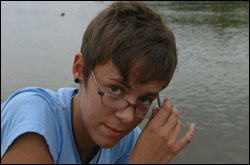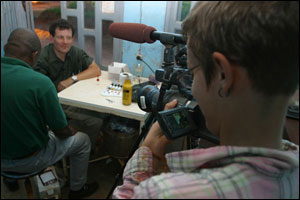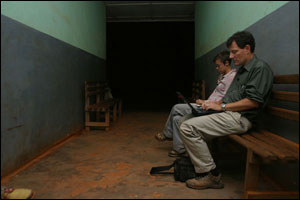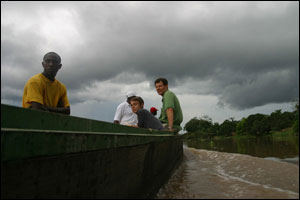Trip to Africa Shows Master’s Student That Journalism Can and Does Effect Change
By Casey Parks
Missouri School of Journalism master’s student Casey Parks won the “Win a Reporting Trip to Africa” contest sponsored by The New York Times and columnist Nicholas Kristof in May. Her winning essay, chosen from 3,800 submissions, spoke of her southern Mississippi heritage, of growing up poor and isolated from the world. She recently returned from her 10-day reporting assignment in Africa, admittedly with more questions than answers. In the following essay, Parks struggles with the issues she encountered in Africa: real poverty, death, reporters’ intervention and journalism’s impact on it all. Read on to follow Casey’s physical and emotional journey through Africa.

Columbia, Mo. (Oct. 24, 2006) — The hospital room smelled like infection. It smelled like sweat and blood and vomit and imminent death. I had been at this hospital in Yokadouma, Cameroon, with New York Times columnist Nicholas Kristof and cameraman Naka Nathaniel for eight hours already, and the smell was getting worse.
When I entered the New York Times contest “Win a Trip With Nick,” I hadn’t expected this smell.
The trip was designed to take one university student to Africa with Nicholas Kristof for 10 days. Kristof has won two Pulitzers – one shared with his wife, Sheryl Wu Dunn, for coverage of the Tiananmen Square riots in 1990 and one for coverage of the Darfur genocide in 2006. In my semester at the Missouri School of Journalism, I had begun to realize how provincial my understanding of the world had been. In a class with Dr. Stuart Loory about confronting controls of the media, I became fascinated with North and South Korea, Pakistan, China and Sudan.
Another Missouri professor, Dr. Berkley Hudson, had encouraged us all semester to follow our bliss. Kristof’s contest was a chance to follow my bliss. I had never had that opportunity before because my family couldn’t afford trips out of the country.
In my essay, I wrote about growing up poor in the South:
“Working as a journalist in Mississippi for a handful of years, I found my past connected me to so many people. Crafting racially charged stories, I saw myself in the eyes of interviewed after interviewed. No, I didn’t know what it was like to be perceived as scary because my melanin shaded me darker. But I knew what it was like to wear out-of-style clothes and want the shoes and cooler lunches that others had.”
After reading 3,800 applications, Nick and others at the Times chose me as his traveling partner. Nick announced his choice in a May 22 editorial. We’d leave from New York together on Sept. 11.
In the months between the contest announcement and my actual trip to Africa, I thought so much of what I would see. Never, did I imagine what I might smell.
In the Hospital
It was day three of our trip through Equatorial Guinea, Cameroon and the Central African Republic.

I looked at the bed in front of me. At 24, Prudence Lenokoumo was only a year older than I am. Already, though, she had three children. A fourth child, now dead, was still inside of her. Now, virtually abandoned by the hospital on the bed in front of me, Prudence looked like she might soon join her child.
She had arrived at the hospital days ago after a midwife failed to help her deliver her child. She and the midwife tried for three days with no success. The midwife even sat on her stomach, hoping to push the child out. Instead, she ruptured Prudence’s uterus. Her family gathered all its money to put Prudence on a motorcycle taxi heading for the hospital 25 kilometers away. Her child dying inside of her, an infection slowly began in Prudence. At the hospital, the doctor refused to operate on her. A cesarean section cost $100, and Prudence didn’t have the money.
Three days after she arrived at the hospital, Nick, Naka and I showed up. We had stopped at the hospital to talk to a doctor about health statistics. When we arrived, we found Prudence unconscious and under her family’s watchful eye. Lying on a rudimentary bed, Prudence breathed with a shudder. Each breath was literally a shake. Her eyes rolled back into her head and did not move. A mosquito, one of the many bugs flying in and out of the room, circled her head.
An operation isn’t possible yet, Dr. Pascal Pipi, the hospital’s only doctor, told us. Even if the family had the $100 to pay for supplies, Prudence was anemic and needed 2,000 cc’s of blood (500 ccs from four different people).
The hospital has no blood bank. Locals won’t donate for fear of the AIDS test required before donation. Prudence’s family, the most likely donors, live 120 kilometers away.
Wanting to have every fact, I asked, “What type of blood does she need?”
Neither the doctor nor the nurse knew off-hand. A few minutes later, the nurse returned: A positive.
I looked at Nick.
“I think I’m A positive,” he said.
In graduate school at Missouri, we talked often in my classes about the issue of journalist intervention. When journalists work on a story, should they themselves become a part of a story? During the semester before I went to Africa, the question consumed me. I read interviews with famous journalists who avowed that under no circumstance should a reporter intervene in a story. Professors said there was a balance. Sometimes, journalists should intervene, but mostly not. If journalists change their stories by becoming participants, they are potentially limiting the impact their story could have.
In my essay for the contest, I wrote about seeing Kevin Carter’s Pulitzer Prize-winning photograph of a vulture preying on a Sudanese girl. Later, people asked if Carter was really helping the girl by taking her picture, and in my essay, I said I wanted to be able to make decisions like that for myself.
Should Journalists Intervene?
My graduate school classes weighing on my mind, the decision was right in front of me at that hospital in Yokadouma.

I’ve never given blood before, but I wanted so desperately then to be A positive which I’m not.
Nick and I looked at Naka. O positive.
Like Nick, Naka could also donate blood to Prudence.
We looked at each other, all unsure. Was it the right thing to do? Should journalists intervene in a story? Would the equipment be sanitary?
It didn’t take long to decide. One question later (“Are the needles sanitary?”), and we were headed toward a donation room.
It took 10 minutes to test the guys’ blood types, 37 minutes to check their blood for HIV.
Prudence’s sister had already donated, and Dr. Pipi, the only doctor for the extended district, agreed to begin with only 1,500 cc’s.
But first, he had two other cesareans to perform.
Waiting with Prudence, her husband, Alain, turned toward me.
“Ma femme,” he said. “Elle est tous a moi.”
My wife, she is everything to me.
Forget the bugs biting me. Forget the red clay caked all over my pants. Forget my sweat, my dirty hair, the stomach that hadn’t been fed since breakfast. At 6 p.m., I worried I might watch a woman die.
Waiting for Prudence’s surgery, other people in the hospital came up to me, eager to tell their own woeful stories. Each story ended with a plea for money.
I went off by myself for 10 minutes, praying as I walked.
“Don’t cry,” I told myself. “Don’t cry.”
Seven hours of waiting later, we found out the doctor had gone home. He was too tired to do another surgery, and he had no sterile equipment left.
“But what if the woman dies?” we asked a nurse.
“That’s God,” she told us in French. “There is no other. He decides when to turn out the lights.”
5 p.m.
A week after we first entered the hospital, we had left Cameroon to work in Bangui, Central African Republic. That night, we received news that Prudence had died.

“Prudence died at 5 p.m. today,” I wrote in my blog.
“I see this in an e-mail, and it should make sense. It should be what I expect.
But I don’t. That thud in the stomach is back.
I’ve hashed through the reasons, though none of them make sense (not together, not as individual pieces of blame).”
Late in the night, after finishing a day reporting in another hospital, I couldn’t quit thinking of Prudence’s death. Though it had been so easy to be angry at the doctor for not treating her sooner, her life had depended on so much else, too. If only she had had transportation or more money, maybe she could have gotten to the hospital sooner.
Trying to process this, I thought of a theory class I had taken at Missouri with Dr. Berkley Hudson. He often had students “follow their bliss” in class by having them read from or show works that had affected their own learning. One class, he asked a student to recite a William Carlos Williams poem she liked.
“so much depends
upon
a red wheel
barrow
glazed with rain
water
beside the white
chickens.”
At the time, I wasn’t sure exactly what the poem meant. Why was it important?
It’s funny how graduate school becomes manifest in the middle of Africa late at night. Suddenly, the poem made sense to me. Williams had written the poem while waiting for a child to die. So much in life depends on so many elemental things. So much of Prudence’s survival would have depended on better roads (in Cameroon, the roads are all red clay. In the rainy season, driven over by huge lumber trucks, they become pocked by rain and weight.), on a closer hospital, on better care, on blood, on money.
After Africa
In the week that followed, Prudence’s death continued to weigh me down as we traversed Africa. Electricity was scarce; so was food. We slept little. Instead, we pushed deeper into each country, stopping at villages all day long, filing stories late at night. The next morning, Nick Kristof would knock on my door at 6 a.m., preparing me for another day of reporting.
At times, only e-mails from friends or professors reminded me that I must keep moving. “I know you must be tired, for so many reasons,” Dr. Hudson wrote to me. “I know you do have the strength to do this. You have been preparing for this for your entire life.”
My entire life. In Dr. Hudson’s theory class, we had often talked about the ways in which our lives affect the way we report. In some sense, one’s life affects what one chooses to cover. I had come to Africa because of my own past. But where would it lead me?
When we left Africa, I knew I would never say my family had been poor again. We had always had medical care. No part of my life had had that strong stench of poverty that Prudence’s room had.
I wrote in my blog:
“A caller to The Briar Lehrer Show (airs on WNYC New York Public Radio) asked why we had to go overseas to write about poverty. ‘There’s plenty of poverty in the U.S.,’ he said. And I understood that. I used to think that all of the time. But nothing compares to what I’ve seen here. Not pawnshops or bankruptcy or the embarrassment of having to buy groceries with food stamps. I’ve never smelled a room like that before. I’ve never seen a doctor leave a woman dying in the next room for four days because she didn’t have the $100 up front.”
Though my body was covered in Africa – literally, my clothes all carried red clay stains – boarding the plane home, I was a little relieved. I was ready to sleep normally, ready to eat a decent meal.
But as soon as I landed in New York for a week of publicity, I knew I was different. Within a few days, I was ready to go back to Africa for more. I arrived in the states with far more questions than answers. We had intervened in the story of Prudence, and I didn’t regret it; but could I keep intervening?
Yes, I had so many questions leaving Africa. The one clear thing I learned, though, is that journalism can and does change things. The comments to my blog after the Prudence story were enormous. So many people wanted to know, where could they send money? Where would their money best be used? Could they go over and volunteer skills?
Reading the impact my stories had made, my future was more manifest than ever before. I must keep writing and searching.
Updated: April 13, 2020